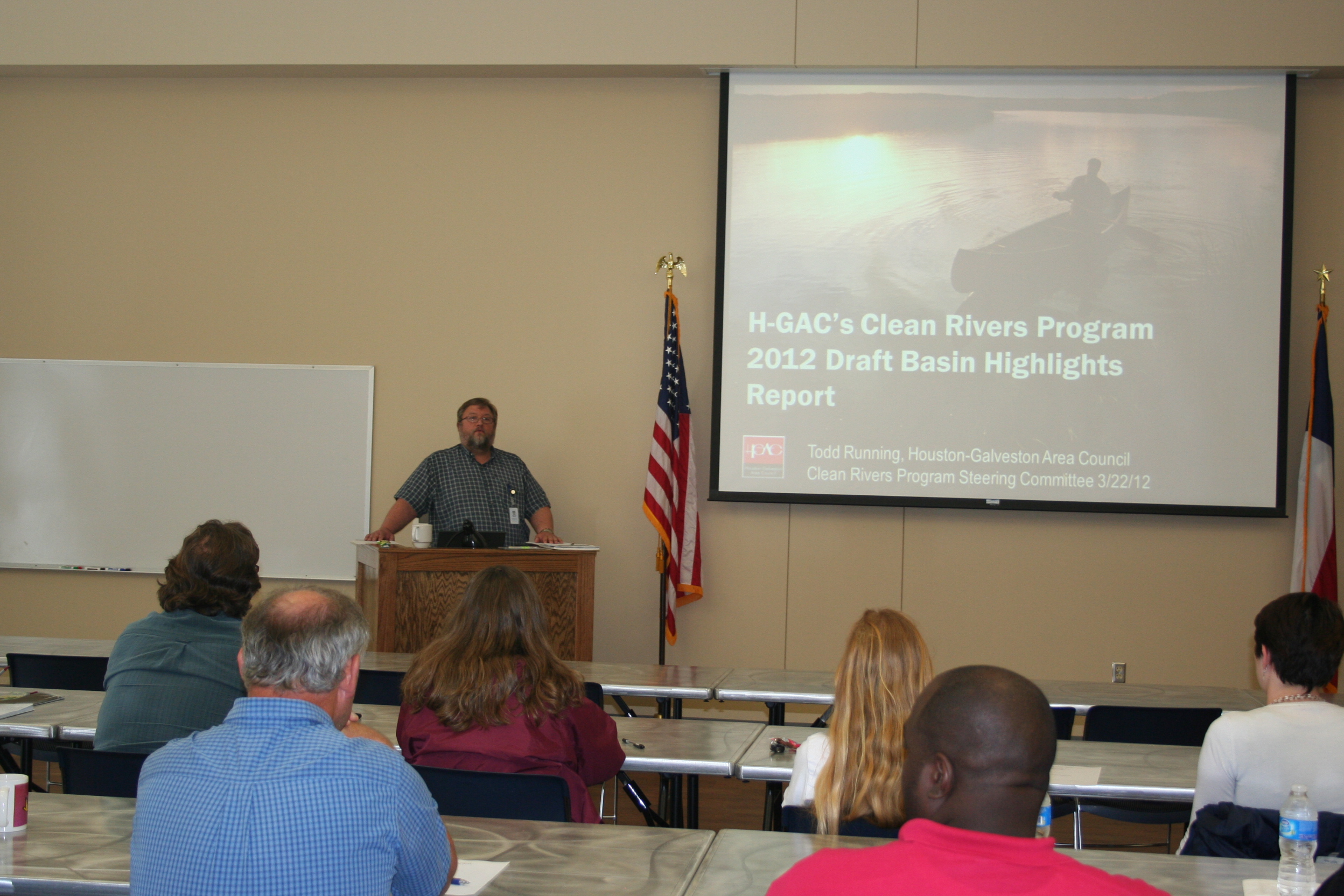Meetings and Workshops
An important component of accomplishing CRP objectives is to educate citizens, stakeholders, and local governments about watershed stewardship and existing water quality issues through stakeholder meetings and educational workshops.

H-GAC invites citizens, business owners, industry representatives, and other interested parties to become part of the planning process through stakeholder group membership when programs, including watershed protection plans (WPP) or Total Maximum Daily Load (TMDL) /Implementation Plans (I-Plan), are developed. Public outreach related to specific watershed planning efforts is reviewed in Section Three of this Basin Summary Report.
The H-GAC’s Clean Rivers Program (CRP) Basin Steering Committee is a diverse group of stakeholders, comprised of counties, cities, state agencies, environmental groups, citizens, and local industries. It serves as the primary forum for discussing various water quality issues that have been identified through the assessment process.
Over the past five years, the Basin Steering Committee has met regularly to:
- Establish annual work plans and budgets
- Review and finalize the 2012, 2013, 2014, and 2015 Basin Highlights Reports
- Discuss changes to the Regional Water Quality Monitoring schedule
- Provide updates for WPPs and TMDLs/I-Plans dependent on CRP data
H-GAC hosted Environmental Awareness Roundtable workshops from 2012–2014 to facilitate cooperation between city staff, county staff, and community organizations to create effective environmental awareness campaigns.
Topics covered since 2012 included:
- Measuring Public Outreach Success/Establishing Metrics
- Social Media for Natural Resource Professionals
- Back the Bay/Regional Awareness Campaigns
In 2014, these workshops became a part of the Clean Waters Initiative workshop series.
The Natural Resources Advisory Committee (NRAC) is a committee of the H-GAC Board of Directors. Its primary roles are to advise the Board on matters involving natural resources and to serve as a roundtable for regional stakeholders. NRAC is composed of representatives from the counties, municipalities, businesses, regional governments, conservation groups, and other regional interests. Water quality is a primary focus of the group discussions.
H-GAC’s Clean Waters Initiative (CWI) program offers free workshops to help local governments, landowners, and residents develop effective strategies to reduce pollution in area water bodies. Workshop attendance ranges from 40 to 60 participants. Workshop topics since 2012 focused on the following:
- Water Quality
- Wastewater Treatment Facilities and On-Site Sewage Facilities
- Coastal Communities
- Capacity Management and Operations Maintenance (Sanitary Sewer)
- Municipal Separate Storm Sewer System (MS4) Minimum Control Measures
- Conservation, Landscaping, Land Use and Low Impact Development
- Stormwater Management and Watershed Planning Projects
- Education, Outreach, and Public Participation
In a collaborative effort with Texas A&M AgriLife, NRCS, USDA, U.S. Army Corps of Engineers, and HCFCD, H-GAC CRP staff coordinated a Riparian Buffer Workshop in 2014 to discuss potential riparian buffer projects and outreach tools that take on a region-wide approach to relaying information. A panel of riparian buffer professionals was developed that will continue to assist H-GAC’s efforts in creating tools and educational materials that educate citizens about the benefits of riparian buffer implementation on a regional scale.
As part of a 604b water quality management planning grant from TCEQ, H-GAC maintains wastewater databases for the region. Using this data, H-GAC produced a series of analyses identifying opportunities to regionalize small, older wastewater systems. These results and the topic of regionalization were discussed with area utilities and other stakeholders at a workshop in 2011. The focus of the discussion was on systems in proximity to impaired waterways.
H-GAC hosts a Fall Planning Workshop each year. This half-day workshop for local governments features presentations on best planning practices for communities and provides an opportunity for collaboration and information sharing.